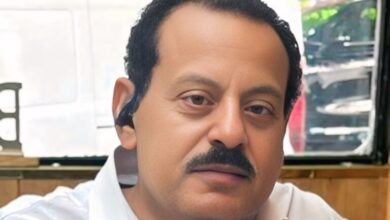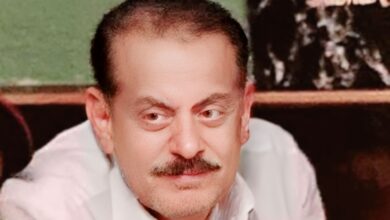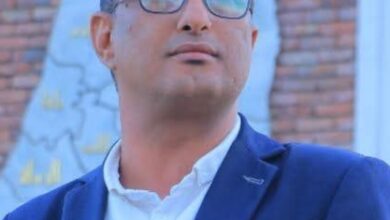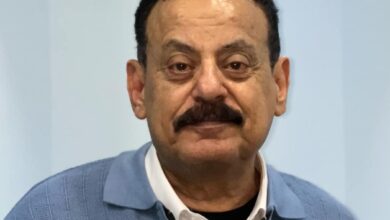A Constricted Space for a Bird
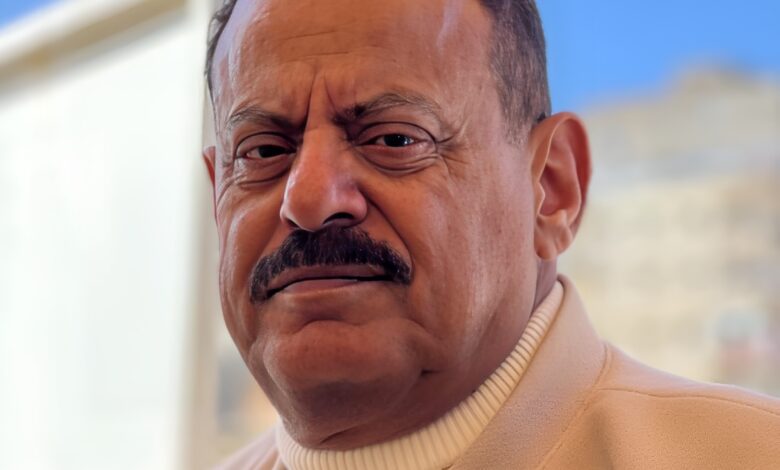
Yemeni mp
Ahmed Saif Hashed
My father was a devoted worker, dedicating many years of his life to the craft of leather processing. This profession is often viewed with disdain by some, as it is perceived as merely an extension of tanning. Such contempt springs from individuals consumed by emptiness and bravado—those who thrive on pillaging and corruption and fail to recognize that legitimate work is a social value and a profound honor, for its practitioners earn their sustenance through hard labor and sweat.
He worked at Albiss company in Aden, where he processed leather, pouring the most significant part of his youth and vitality into this craft. While leather processing carries inherent health risks, my father chose the opportunity for work over the specter of unemployment, embodying the adage: “The dust of labor is better than the saffron of idleness.”
As a result of the salt, leather, and chemicals involved in his work, my father suffered from shortness of breath and persistent nighttime coughs—ailments that plagued him until the end of his life.
Throughout more than fifty years of my existence, I remained unaware that social classes in Yemen looked down upon the profession of leather
tanning and its workers, regarding them with disdain. I had always believed we belonged solely to the class of the poor, oblivious to the fact that other demographics, including tribal and nomadic groups, viewed us as inferior—this realization came, perhaps, much later in my life.
My father began his professional journey as a worker in leather processing, identifying with the working class and families of limited means. In many ways, this profession serves as both a continuation and an extension of the craft of tanning.
In the socialist era of South Yemen, there were legal protections and punitive measures in place for those who insulted, belittled, or otherwise harmed a citizen based on their profession or low social class, particularly with the intent to demean.
I recall that the prevailing Penal Code and its commentaries stipulated that if an individual directed a severe insult or provocation resulting in significant psychological distress, and the recipient of this insult subsequently committed murder, the perpetrator would not be held accountable for the act.
According to the explanations provided by the 1976 Penal Code, the act of murder could be attributed to the offender’s state of extreme psychological agitation triggered by the severe insult. This agitation rendered the individual incapable of functioning normally, impairing their awareness of their actions under the influence of the provocation instigated by the victim. Consequently, the law restricted judges to imposing a maximum prison sentence of no more than five years.
Furthermore, the cultural and social awareness prevalent in the South during that time was ideologically aligned with the lower classes, often referred to as the working class, which included laborers, farmers, artisans, fishermen, and others.
These individuals were regarded as “the true stakeholders in the revolution.” This collective consciousness nurtured a sense of pride in our identity, allowing us to celebrate our poverty without feeling diminished by our professions or social standing.
In addition to this, there were economic initiatives and a palpable enthusiasm from the authorities aimed at uplifting marginalized groups, striving to enhance their economic, educational, and social conditions.
Numerous efforts were made to reintegrate these individuals into society, particularly during the presidency of Salim Robaea Ali, known as “Salmin. One of the most captivating and inspiring chants I heard from the marginalized during my middle school years in Al-Turbah in the 1970s was:
Salmin, Forward, Forward ** Salmin, We Are Not Servants
Salmin, Municipal Workers ** Salmin, We Do Not Endure Harm”
The term “servant” was banished from the lexicon used to describe any municipal worker, a shift from previous norms.
* * *
After an extended hiatus from his former profession, my father was compelled to return to it out of sheer necessity. He had exhausted his savings and endured years of hardship following the martyrdom of my brother, Ali Saif Hashed, in our village. My father faced persecution from the authorities in Sana’a, who sought to arrest him despite his having committed no crime. He had never engaged in politics nor held any political affiliations, other than being the father of Ali and carrying the heavy burden of his loss.
My father resumed his work in leather processing for the second time, spending nearly two years in the steam house located in Al “Khasaf” neighborhood of “Crater” during the 1980s, working alongside his dear friend, Abdul Hamid. Despite suffering from nighttime coughing fits, a consequence of his prior work at Al “Biss” company, he persevered.
Amir Ali Salam Fawz, who worked alongside my father during this period, remarked on his character: “Saif Hashid was a self-made man, and I had the honor of working with him in Abdul Hamid’s steam house in Khosaf. My father, Ali Salam, served as a driver for Abdulhamid, while my brother and I spent our summer school breaks working in leather processing as well. We received all types of salted and dry hides from Sheikh Othman and Sheikh Al-Duwail at the steam house. My uncle Saif would sort them, a crucial task requiring expertise and skill. Not just anyone could learn this craft. The hides were classified into two main types: goat skins and sheep skins. The sorter would inspect each hide to determine its grade—first, second, third, or fourth—each with its designation: ‘pure’ for first grade, ‘kashar’ for second, and lower grades for third and fourth. After sorting and counting, we mixed salt with
chemicals for each hide and created special stacks for each type in the steam house, which had the capacity for large quantities of hides. During external orders, we weighed the hides into large bundles, placed them in a special press machine for bundling, secured them tightly, and individually wrapped each bundle for weighing again to ensure accuracy.
We labeled them with specific formats indicating the destination country or the name of the port. Once prepared, they were transported to the port and shipped to Europe—Italy, France, and others—through a special office where trader Abdul Hamid conducted business.”
This return to leather processing was driven by necessity more than ever before.
My father chose to work in a profession he was skilled at, despite its toll on his health—what remained of it, to be precise. Between the vigor of youth and the twilight of life lies a long span marked by relentless toil, with health diminishing yet enduring stubbornly and patiently.
In this way, the poor prioritize labor over their health, regardless of the risks involved. They choose work above all else, even if it jeopardizes their well-being. They toil diligently to provide for their families through honest means earned by the sweat of their brows, striving to maintain at least a minimum of dignity for themselves and their families, who are deprived of much. They do so without succumbing to the fleeting temptations of greed or violence, without resorting to plunder, murder, or ill-gotten gains. I honor our fathers; they were truly great and deserving.
Throughout my father’s life, I came to understand that he revered work and honored his commitments with a precision bordering on anxiety. He labored tirelessly, dedicating his utmost attention and care to his tasks, striving diligently to achieve as much as possible. He would retire to bed exhausted yet with a clear conscience, rising early with renewed energy and alertness that persisted throughout the hours of labor.
* * *
During the years of war in Sana’a, I took to my Facebook page to honor my father, the leather tanner, proudly celebrating his craft. For the first time, I learned from my friend and colleague, Judge Abdulwahab Qotran, that in certain northern regions and among particular tribes, the profession of leather tanning is held in disdain.
Practitioners are deemed of inferior lineage, likened to butchers, barbers, and others of similar or lower status.
A saying that circulated among the tribes encapsulated this sentiment:
“Beware of the company of the lowly, and you shall be safe—
The beautifier, the cupping therapist, and the butcher,
The barber, the tanner, and the weaver.”
The profession of “sorting hides” is an extension of tanning, closely allied with it, yet tanners are relegated to the same category as butchers due to their occupational ties. This reflects a hierarchical social perspective steeped in blatant racism, both in thought and practice.
In a conversation with my military college colleague, Hussain from Al-Jawf, whom I encountered during the war, I learned something else. He informed me that until recently, the profession of buying and selling had been viewed as shameful among certain tribes in Al-Jawf. From their perspective, it was an undesired and disrespectable occupation, casting a stigma on those who engaged in it. My father, too, had spent a significant period working in this field.
Thus, concepts and values are turned on their head; those who propagate such views are often the ones whose perceptions are inverted. They create erroneous and distorted concepts, convinced of their validity. In their eyes, those who engage in honest work and earn a living through hard labor are marked by shame, pursued by a curse that seems inescapable, affecting both them and their descendants—an enduring curse that brands them with dishonor, contempt, and racial disdain. This disdain springs from a deep-seated distortion or emptiness in their consciousness, fueled by regressive and superficial logic.
I take profound pride in my father’s work and in all the professions he undertook throughout his life, never diminishing the humanity of any social class.
I detest racial classification and the hierarchy of origins that leads to the marginalization and contempt of those deemed inferior. I scorn elitism and reject traditional, stereotypical thinking rooted in a hierarchy that fosters one person’s disdain for another.
My admiration for my father’s professions has only deepened, and I perceive them from a perspective distinct from that of those who suffer from inferiority complexes or flawed upbringings. In such a reality, I find value in those who thrive in adversity, like the prickly pear, the cactus, or al sidr tree, which defy nature’s harshest challenges.
They stand tall and resolute, blooming and bearing fruit even in the most oppressive conditions, as if their very existence embodies wisdom, resilience, and a challenge to the pain of nature. They raise their heads high, adorned with vibrant colors, offering nectar to bees and people alike.
I take pride in being the son of this hardworking father, who has become a representative of the people, fulfilling his role with dignity. As I chart my own course, I aim to remain independent—unaffiliated with any party or serving as an independent parliamentary representative in truth and integrity.
I aspire to be a voice of free thought and independent stance, encapsulated in my slogan: “Elect those who represent you, not those who represent themselves.”
I firmly believe—or at least I envision—that I remain steadfast and loyal to this besieged people, who have suffered under the yoke of their so-called elites and dignitaries. My commitment to the pledge I made to my homeland endures, even as the lords of the land betray their own kin, and once-magnificent homes descend into the deepest abysses. One day, history will cast many of these high-ranking individuals into its foul refuse, alongside those who have inflicted great calamities upon this nation and perpetrated egregious betrayals with flagrant audacity and unabashed shamelessness, bringing indelible disgrace to Yemen in all its expanse. This is not a matter of ego but a profound source of pride; if I cannot take pride in this, what else remains for me to cherish?
In summary, I abhor the stereotypical thinking that permeates outdated social hierarchies based on lineage, social status, or any form of racism. I reject the toxic tribalism and the spread of hatred that threaten the essence, unity, and future of our homeland. It is only fitting that I express my gratitude to my father: “How great you are, my father!”
* * *
After reflecting on what my friend Hussein shared with me and what my companion Abdulwahab Qotran revealed about the significance of my identity and that of my peers within the cultural imagination of certain tribes and regions in Yemen, I found no shame in the reflections of inferiority that such belonging might invoke. Rather, I defended my beliefs with pride, unafraid of ridicule or embarrassment regarding my father’s work or the professions he pursued throughout his life.
I take immense pride in myself and in my father, who labored tirelessly for our dignity. I cherish my belonging, which has carved out a place for itself in solid rock, embracing the dual challenge of being and becoming as I ought.
However, what matters most is that I refused to be drawn into the pursuit of a narrow identity that would undermine or distort the greatness I assert fills me and resides within my consciousness and emotions, striving to protect me from any fragility. I have not compromised the moral standards that resonate with this person who inhabits me, nor with the humanity I seek beyond my own existence.
This does not imply that I do not resist or challenge the belittlement that surrounds me, nor do I shy away from advocating for the communities that rightfully deserve their full entitlements, particularly the right to citizenship. I have never sought an identity that is unworthy of me as a human being. Yet, it is imperative that we rise against emptiness and tyranny.
* * *
I do not engage in slander, nor do I make claims of empty falsehood. I am neither the Mahdi nor a descendant of the Prophet; I do not assert that I am God or His son, nor do I proclaim that I emerged from celestial waters. I am the enduring pain that resides in the depths of my wounds, the strength of truth when falsehood prevails, and the refuge for those ensnared by oppressors in their quest for a homeland.
I am the stubborn wound, the fierce defiance in the face of the tyrannical Pharaoh. I embody all forms of “no,” a relentless rejection of tyranny. I draw sustenance from my wounds without humiliation or question, basking in the sunlight that spills over the mountain peaks. Even as my days crumble and my sorrows reach their zenith, my youth still pulses with vigor, igniting fire and light against the encroaching twilight and shadows of darkness.
Perhaps a hungry soul may bring me to tears, and a proud beggar might humiliate me, yet I refuse to bow to a world that seeks to subjugate us or compel us to worship its crowns. I reject the physics that condemns those who dare to explore its mysteries or that substitutes truth with mere shadows. I stand as an infidel against the hunger that seeks to humiliate us, an infidel against the usurpation of consciousness and the domestication of humanity.
A cry against my fate erupts from within me like a cannonball: no, a thousand times no.
* * *
I am the son of the tanner who rises against his reality each day, unwavering and undaunted, never submitting to oppression. I am the son of the tanner who refuses to yield to fate, remaining steadfast even when calamities weigh as heavily as mountains. I am the tanner’s son who grapples with his afflictions, resisting until the final breath.
I am the son of the farmer who rebels against a society that continues to venerate its oppressors, who stands against a power that dares to claim justice while its tyranny far exceeds the depths of the ocean.
This power boasts over my great homeland, privatizing citizenship and distributing certificates of absolution at will, erasing equality, spreading poverty like dense darkness, and imprisoning freedom in an iron vault.
I condemn murder and do not trivialize it; I do not drink blood nor spill it, yet I am accused of indulging in alcohol. I am the son of a father who does not sell death or bestow it as a measure of manhood or a passage to heroism. My father is a confectioner, a seller of sweetness, who thrives on the fruits of his labor and the sweat of his brow. He spreads joy and delightful flavors, while steadfastly rejecting war, destruction, and the spread of ruin.
I am my father’s son; I have not constructed glory upon heaps of skulls, nor have I ever celebrated or boasted about the vastness of graves or the long lines of coffins. I have never rejoiced in the rubble of victims, nor have I fueled hatred or the deep-seated malice that festers within.
* * *
I am the son of my father, weighed down by heavy burdens. We labor to the brink of exhaustion, enduring suffering from dawn until dusk.
We have never allowed sorrow to take root in our hearts, nor have we peddled illusions to the victims of our plight. They have distorted our consciousness with a multitude of speeches, encumbering it with countless deceits and fabrications.
They have propagated their falsehoods from the highest minarets, igniting fires in their wake. They have laden the earth with the sorrows of mourning, enticing the people with promises of houris and rivers of honey and wine.
Underneath cloaks and beards, they hide their treachery, concealing a thousand executioners and shadows beneath their turbans. Yet if we indulge in secret pleasures, our eyes shed pearls, and we embark on a journey toward God.
I do not take pride in lineage, nor in those who feast on the flesh of others. I do not boast of ancestry, tribe, or the deeds of those who kill. I do not beg; my sustenance lies in history, nor do I claim dominion or inheritance. I do not assert a right from before Adam and Eve, or from the time of the Pleiades.
I am not of celestial waters, nor do I take pride in being a descendant of Ali or Fatimah. I am the son of the tanner and the farmer, the seller of sweets who spreads joy and happiness. My father has weathered the trials of time, earning his livelihood through the sweat of his brow.
I am not a self-burdened by its own weight. I cast aside the self in the face of tyranny, unrepentant, and I strive to dismantle the injustices that weigh heavily on every shoulder. I am the self that takes pride in its origins, asserting that it is not of heavenly water, resisting those who would diminish it to mere dung.
I am the dreamer, the son of beloved ones. I belong to a grand dream as vast as the galaxy, indeed as expansive as this limitless universe, which shatters constraints and journeys into the distant, without boundaries or end.
* * *


